NOTE IMDb
7,6/10
5,6 k
MA NOTE
Ajouter une intrigue dans votre langueWhen an aging activist is arrested, the lives of the accused, the lawyers, and the judge intertwine to reveal bigotry that underscores the judicial system.When an aging activist is arrested, the lives of the accused, the lawyers, and the judge intertwine to reveal bigotry that underscores the judicial system.When an aging activist is arrested, the lives of the accused, the lawyers, and the judge intertwine to reveal bigotry that underscores the judicial system.
- Réalisation
- Scénario
- Casting principal
- Récompenses
- 21 victoires et 10 nominations au total
Sukhdas Suryawanshi
- Sukhdev (court staff)
- (as Sukhdas Suryawamshi)
Avis à la une
RATED 8/10
Language: Marathi
Source: Netflix
RECOMMENDED
Well crafted drama about court room and the persons in court room. Too much of artistic and slow but its perfect.
The real life and court life of different characters and their views of personal and court life.... the climax is the big slap on citizen's face... the last 15 seconds tells the story with superb impact.... Must watch...
The real life and court life of different characters and their views of personal and court life.... the climax is the big slap on citizen's face... the last 15 seconds tells the story with superb impact.... Must watch...
Chaitanya Tamhane's directorial debut, Court, is a multilingual, award- winning film on the "quiet violence" of the judicial system and how the State uses it to suppress political activists. Financed by the Hubert- Bals Fund and private equity, it opened to rave reviews and won Best Director and Best Film in the International Competition section of the 16th Mumbai Film Festival. It also premiered at the Venice Film Festival earlier in the year, where it won the Lion of the Future Award for the best first feature. Court successfully invokes the mood of a trial based on patently ridiculous charges, conducted with no intent other than disciplining and harassment of an activist. A phenomenon that is all too common in India. The theme is very timely given the increasingly intolerant nature of the Indian State and the large number of political prisoners languishing in jail all across the country.
The film follows the trial of Narayan Kamble (Vira Sathidar), a Dalit political activist and lokshahir (people's poet) who is arrested on stage during a performance in Bombay on charges of "abetment of suicide." The police claim that Kamble has penned and performed "incendiary" lyrics calling on Dalits to "drown themselves in sewage" provoking a municipal sanitation worker to actually take his own life by drowning in the very sewer it is his duty to clean. The absurdity of the charge is matched by the (mock?) seriousness with which it is pursued but the police and the officials of the Sessions court. While the politics of false charges and suppression of activists via legal means is an important theme in the film, Tamhane also uses the context of the trial to explore the everyday lives of the principal actors in the courtroom; especially the lawyers for defense (producer Vivek Gomber) and prosecution (played by Geetanjali Kulkarni), and the judge (Pradeep Joshi). What emerges is how extraordinary injustice is embedded in quotidian affairs. The prosecution lawyer argues against bail, ensures that an honest man of advanced years rots in police custody for no reason at all and then goes home to cook dinner and watch TV with her family.
The ponderous legal system is certainly the main protagonist, as is evident in the name of the film. And as a useful counterpoint to the brilliant and satirical Mohan Joshi Hazir Ho, Court forces us confront the fact that the byzantine alleyways of justice and the proverbial tarikh pe tarikh, are not merely the unintended result of an uncaring and bureaucratic system but rather used deliberately by the State to remove its more inconvenient citizens for some time, say three or four years. At which time it is the headache of the next set of rulers.
See the full review at: http://sanhati.com/excerpted/11761/
The film follows the trial of Narayan Kamble (Vira Sathidar), a Dalit political activist and lokshahir (people's poet) who is arrested on stage during a performance in Bombay on charges of "abetment of suicide." The police claim that Kamble has penned and performed "incendiary" lyrics calling on Dalits to "drown themselves in sewage" provoking a municipal sanitation worker to actually take his own life by drowning in the very sewer it is his duty to clean. The absurdity of the charge is matched by the (mock?) seriousness with which it is pursued but the police and the officials of the Sessions court. While the politics of false charges and suppression of activists via legal means is an important theme in the film, Tamhane also uses the context of the trial to explore the everyday lives of the principal actors in the courtroom; especially the lawyers for defense (producer Vivek Gomber) and prosecution (played by Geetanjali Kulkarni), and the judge (Pradeep Joshi). What emerges is how extraordinary injustice is embedded in quotidian affairs. The prosecution lawyer argues against bail, ensures that an honest man of advanced years rots in police custody for no reason at all and then goes home to cook dinner and watch TV with her family.
The ponderous legal system is certainly the main protagonist, as is evident in the name of the film. And as a useful counterpoint to the brilliant and satirical Mohan Joshi Hazir Ho, Court forces us confront the fact that the byzantine alleyways of justice and the proverbial tarikh pe tarikh, are not merely the unintended result of an uncaring and bureaucratic system but rather used deliberately by the State to remove its more inconvenient citizens for some time, say three or four years. At which time it is the headache of the next set of rulers.
See the full review at: http://sanhati.com/excerpted/11761/
Watching Court is a unique experience. Its lazy elegance and life like sets. Definitely not for masses.
An avid Hindi film lover has a quite interesting but unreal picture of an Indian courtroom in his mind full of phrases such as My Lord, Judge Sahib, Objection sustained, Objection Overruled, Order Order, Mere Kaabil Dost, Mr. Public Prosecutor, Case Ki Agli Sunvaayi, Tareekh Pe Tareekh and many more.
However the truth remains shockingly contradicting to the on screen presentation and that's exactly what you get to witness in Chaitanya Tamhane's exceptional directorial debut in Marathi Cinema having an interesting cast ensemble and an explosive subject. Based on a completely unbelievable case filed by the State against an old age artist, admittedly the film takes its own times to influence the viewers with a slow paced story progression, resembling the way court cases keep crawling in India till years or even decades. But remaining within this off-beat framework, COURT also makes you feel many painful blows one after another while watching the case proceedings in a strange state of amazement. And further paints a hugely upsetting picture of our present Police and Judicial system forcing you to wonder that how come this brutally honest film was awarded a National recognition by the Government of India itself ..instead of getting banned.
To make your realize the mistake you would be committing by missing it, here are its major exceptional features that might influence you to change your mind and watch it at the earliest in the coming days.
1. You must have seen many films revolving around a false case being filed by the Police officials against an innocent person. But can you believe the height of absurdity when an investigating officer files a case against a 65 years old revolutionary social activist/artist/writer/singer, with a charge that one of his songs talking about suicide, provoked a poor sewage worker to kill himself by getting drowned in the gutter full of hazardous gases.
2. The case not only gets duly filed by presenting more than one witnesses, but it also gets extensively discussed within the court with the lady lawyer reading out many long pages full of false accusations adding a fine touch of black humour that instantly makes you laugh at the absurdity being practiced within the court itself.
3. The sequences bravely expose the flaws in our police and judiciary system when the police officer has no clues about a letter and existence of one crucial witness but still tries to defend his irresponsible actions so casually. Besides one feels disgustingly surprised when the honourable judge refuses to hear the next case as the lady coming forward is wearing a sleeveless dress that is considered to be disrespectful attire in a court room.
4. Through its various references of the weird case and personal lives of both the lawyers fighting it spiritedly, COURT also mocks at the widely prevalent class divide in our society and issues such as freedom of expression, fake arrests and exploitation of laws by the lawyers themselves ignoring the innocent lives and families being affected severely.
5. The language is a mix of Marathi, English, Hindi and Gujarati too, exactly like you find in the region of Mumbai. Reading the above features, you can easily guess that COURT is a rare thought provoking treat coming from our Regional Indian Cinema.
So just go for it at the earliest and don't miss many small but important real life insertions in its brilliant on screen execution such as:
A. The way the lawyer's parents treat a stranger visiting their house, who happens to be their son's client.
B. The strange, unconcerned kind of attitude in the answers given by the dead worker's widow in the court, who later refuses to take any money as help but asks for some work from the lawyer dropping her home.
C. The particular shot of a printing press, where the police officer arrives to arrest the artist checking his new book being printed, but the press worker sitting just a few feet away continues with his work of compiling a magazine pages showing no concern at all.
D. Just study the way, most of the film has been shot with all still frames with the camera placed in a single position making it more real as if one is sitting right there in the theater witnessing the court's proceedings.
E. And then, many shots continuing to a much longer duration than required with nothing happening on the screen, results in the viewer feeling more involved with the characters and their helpless plight.
In the performances, all inspiring actors (non-professionals mostly) provide a big support to the film led by Vivek Gomber as the defence attorney (also the film's producer), Geetanjali Kulkarni as the public prosecutor, Vira Sathidar as the accused artist/social activist and Pradeep Joshi as the judge. But the choice of other non-actors appearing in very short roles throughout the film could have been better.
The film ends with the final 10 minutes revolving around the judge alone and the stress he feels, leaving the viewers with many uncomfortable and horrifying questions about the court-procedures running in their minds. And perhaps the climax (showing him enjoying a picnic with his family, slapping one of the kids for disturbing his sleep), also wishes to present a possible conclusion that after all even a judge is a human too who does have his own personal life, choices and limitations.
In fact that's exactly what makes COURT a highly recommended movie for all thinking minds. So whatever language or region you belong to, shed all your reservations of watching a regional movie with English subtitles and do yourself a favour witnessing COURT at the earliest as its indeed yet another important benchmark set by the Marathi film-makers in our rich Indian cinema undoubtedly.
However the truth remains shockingly contradicting to the on screen presentation and that's exactly what you get to witness in Chaitanya Tamhane's exceptional directorial debut in Marathi Cinema having an interesting cast ensemble and an explosive subject. Based on a completely unbelievable case filed by the State against an old age artist, admittedly the film takes its own times to influence the viewers with a slow paced story progression, resembling the way court cases keep crawling in India till years or even decades. But remaining within this off-beat framework, COURT also makes you feel many painful blows one after another while watching the case proceedings in a strange state of amazement. And further paints a hugely upsetting picture of our present Police and Judicial system forcing you to wonder that how come this brutally honest film was awarded a National recognition by the Government of India itself ..instead of getting banned.
To make your realize the mistake you would be committing by missing it, here are its major exceptional features that might influence you to change your mind and watch it at the earliest in the coming days.
1. You must have seen many films revolving around a false case being filed by the Police officials against an innocent person. But can you believe the height of absurdity when an investigating officer files a case against a 65 years old revolutionary social activist/artist/writer/singer, with a charge that one of his songs talking about suicide, provoked a poor sewage worker to kill himself by getting drowned in the gutter full of hazardous gases.
2. The case not only gets duly filed by presenting more than one witnesses, but it also gets extensively discussed within the court with the lady lawyer reading out many long pages full of false accusations adding a fine touch of black humour that instantly makes you laugh at the absurdity being practiced within the court itself.
3. The sequences bravely expose the flaws in our police and judiciary system when the police officer has no clues about a letter and existence of one crucial witness but still tries to defend his irresponsible actions so casually. Besides one feels disgustingly surprised when the honourable judge refuses to hear the next case as the lady coming forward is wearing a sleeveless dress that is considered to be disrespectful attire in a court room.
4. Through its various references of the weird case and personal lives of both the lawyers fighting it spiritedly, COURT also mocks at the widely prevalent class divide in our society and issues such as freedom of expression, fake arrests and exploitation of laws by the lawyers themselves ignoring the innocent lives and families being affected severely.
5. The language is a mix of Marathi, English, Hindi and Gujarati too, exactly like you find in the region of Mumbai. Reading the above features, you can easily guess that COURT is a rare thought provoking treat coming from our Regional Indian Cinema.
So just go for it at the earliest and don't miss many small but important real life insertions in its brilliant on screen execution such as:
A. The way the lawyer's parents treat a stranger visiting their house, who happens to be their son's client.
B. The strange, unconcerned kind of attitude in the answers given by the dead worker's widow in the court, who later refuses to take any money as help but asks for some work from the lawyer dropping her home.
C. The particular shot of a printing press, where the police officer arrives to arrest the artist checking his new book being printed, but the press worker sitting just a few feet away continues with his work of compiling a magazine pages showing no concern at all.
D. Just study the way, most of the film has been shot with all still frames with the camera placed in a single position making it more real as if one is sitting right there in the theater witnessing the court's proceedings.
E. And then, many shots continuing to a much longer duration than required with nothing happening on the screen, results in the viewer feeling more involved with the characters and their helpless plight.
In the performances, all inspiring actors (non-professionals mostly) provide a big support to the film led by Vivek Gomber as the defence attorney (also the film's producer), Geetanjali Kulkarni as the public prosecutor, Vira Sathidar as the accused artist/social activist and Pradeep Joshi as the judge. But the choice of other non-actors appearing in very short roles throughout the film could have been better.
The film ends with the final 10 minutes revolving around the judge alone and the stress he feels, leaving the viewers with many uncomfortable and horrifying questions about the court-procedures running in their minds. And perhaps the climax (showing him enjoying a picnic with his family, slapping one of the kids for disturbing his sleep), also wishes to present a possible conclusion that after all even a judge is a human too who does have his own personal life, choices and limitations.
In fact that's exactly what makes COURT a highly recommended movie for all thinking minds. So whatever language or region you belong to, shed all your reservations of watching a regional movie with English subtitles and do yourself a favour witnessing COURT at the earliest as its indeed yet another important benchmark set by the Marathi film-makers in our rich Indian cinema undoubtedly.
I loved this film for it's simple and real depiction of Indian courts.
This is as close as it can get in depicting how the Indian judicial courts deal cases. Please note that this film is not exactly about a particular case, but it was more so a comment on how the judicial system works in India. Although, a case was taken to represent the judicial procedures, I looked at this film as a showcase of the process in itself.
There is a lot of reflection of reality which is a rarity in Indian films. We have camouflaged films or those which in the name of depicting reality show us the perspective of makers. The best realistic film was "Black Friday" as per me and this comes the second best. Second only because it did not have an engaging storyline or one that we would be keen to know, All it has, is a case at best about a man who is accused of raging emotions.
This is a Marathi film and I commend the fact that Marathi films have come a long way. They have made films like "Shwaas" "Deool" and many others which are like the reflection of the possibility of Indian cinema. Sadly, very few films have explored Indian emotions, Indian mindset and told Indian stories with utmost honesty.
I applaud the director Chaitanya Tamhane for not putting in any drama and also from refraining from any commercial elements and showing things as they are.
Performances are true to the characters by each one. From a sweeper to a lawyer and judge, everyone played their role as they would live it if it was their own life. The camera was used as a tool to capture the happenings instead of making anyone conscious of its presence.
I am going with 4/5. Loved it but I doubt if I would sit through this another time.
This is as close as it can get in depicting how the Indian judicial courts deal cases. Please note that this film is not exactly about a particular case, but it was more so a comment on how the judicial system works in India. Although, a case was taken to represent the judicial procedures, I looked at this film as a showcase of the process in itself.
There is a lot of reflection of reality which is a rarity in Indian films. We have camouflaged films or those which in the name of depicting reality show us the perspective of makers. The best realistic film was "Black Friday" as per me and this comes the second best. Second only because it did not have an engaging storyline or one that we would be keen to know, All it has, is a case at best about a man who is accused of raging emotions.
This is a Marathi film and I commend the fact that Marathi films have come a long way. They have made films like "Shwaas" "Deool" and many others which are like the reflection of the possibility of Indian cinema. Sadly, very few films have explored Indian emotions, Indian mindset and told Indian stories with utmost honesty.
I applaud the director Chaitanya Tamhane for not putting in any drama and also from refraining from any commercial elements and showing things as they are.
Performances are true to the characters by each one. From a sweeper to a lawyer and judge, everyone played their role as they would live it if it was their own life. The camera was used as a tool to capture the happenings instead of making anyone conscious of its presence.
I am going with 4/5. Loved it but I doubt if I would sit through this another time.
Le saviez-vous
- AnecdotesSome cast members were untrained, non-professional actors. In the case of the woman who plays the deceased's widow, it's eerie how unaffected the scene is before you realize that it's reality. (The woman is widowed in real life. Her husband was a manhole worker.)
- Bandes originalesDhanya Dhanya Tumhi Sarkar
Written and performed by Sambhaji Bhagat
Meilleurs choix
Connectez-vous pour évaluer et suivre la liste de favoris afin de recevoir des recommandations personnalisées
- How long is Court?Alimenté par Alexa
Détails
Box-office
- Montant brut aux États-Unis et au Canada
- 22 898 $US
- Week-end de sortie aux États-Unis et au Canada
- 4 806 $US
- 19 juil. 2015
- Montant brut mondial
- 57 416 $US
Contribuer à cette page
Suggérer une modification ou ajouter du contenu manquant







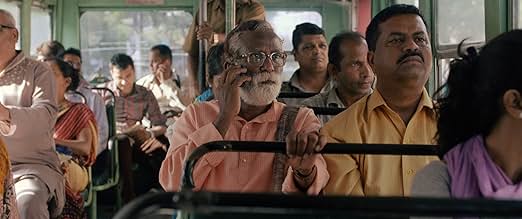
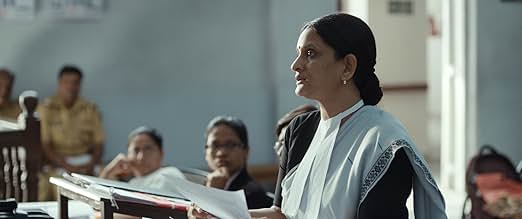
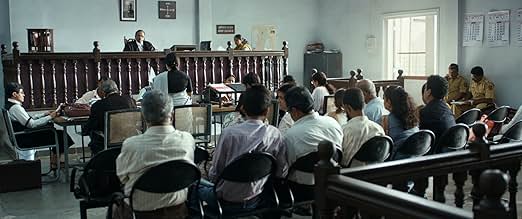
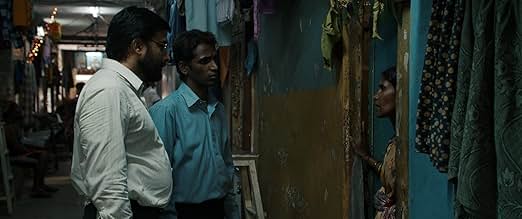
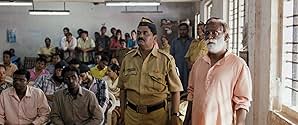













![Peepli [Live]](https://m.media-amazon.com/images/M/MV5BNDc1YTEwYmUtYTIxMC00Mjg4LWJmODctNGNiYjNjMTA3NjY5XkEyXkFqcGc@._V1_QL75_UY207_CR2)

